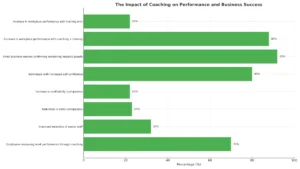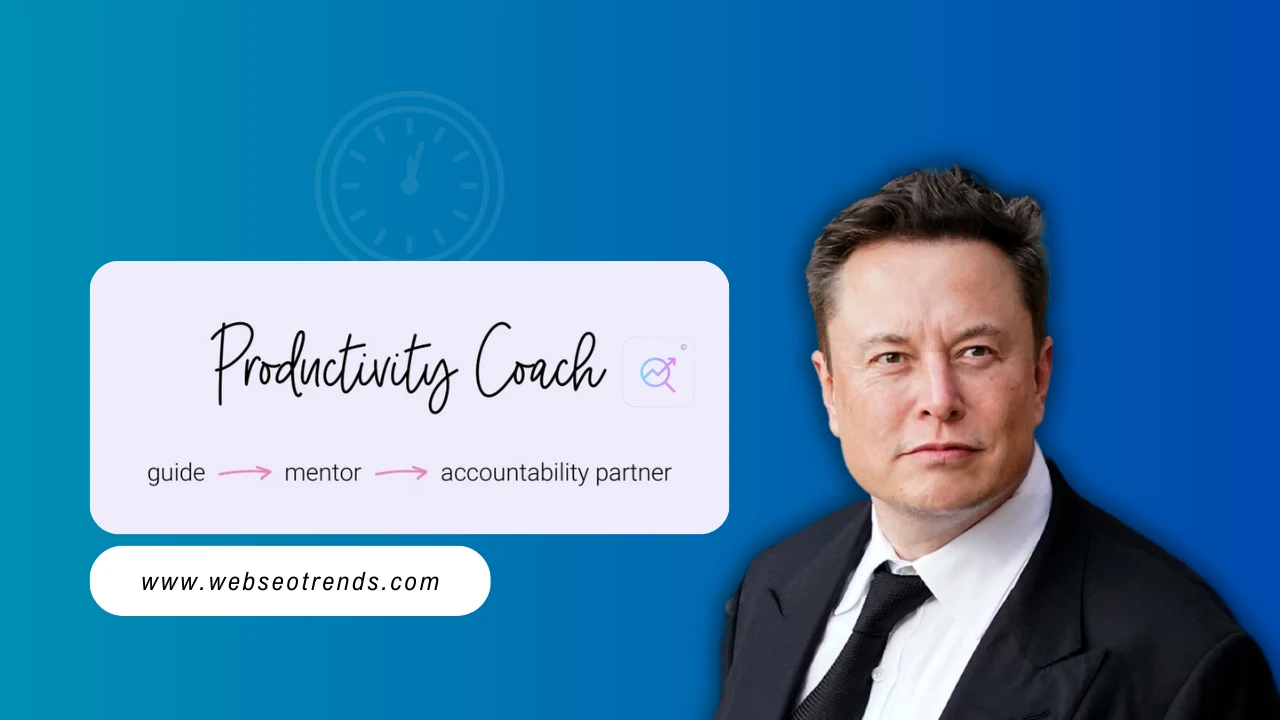Did you know that a structured coaching program can boost your productivity by 88%? That’s not all – 70% of people who work with coaches report improved work performance, better communication skills, and stronger relationships.
However, finding the right coach isn’t as simple as picking the first name that pops up in your search results. In fact, with business coaching packages ranging from $500 to $5,000 per month, you need to make sure you’re investing in the right guidance for your needs.
That’s why knowing how to find a business and productivity coach who matches your goals and working style is crucial. With 33% of founder-mentored entrepreneurs becoming top performers, choosing the right coach can be the difference between stagnation and success.
Ready to find a coach who can help you reach your full potential?
Let’s walk through everything you need to know about finding and choosing the perfect business and productivity coach for your journey.
What is a Business and Productivity Coach?
A business and productivity coach serves as a collaborative partner who guides professionals toward enhanced performance and efficiency. Business coaching primarily focuses on organizational growth, strategic planning, and leadership development. Through this partnership, professionals receive guidance in defining goals, creating actionable strategies, and overcoming business challenges.
Productivity coaching, additionally, specializes in maximizing personal and professional efficiency. A productivity coach works with clients to streamline workflows, enhance time management, and develop sustainable systems for long-term success. Specifically, these coaches assess work habits, identify improvement areas, and create customized plans to boost output.
The coaching process encompasses various components tailored to individual needs. Business coaches concentrate on four key areas: leadership development, strategic planning, team performance, and accountability. Furthermore, productivity coaches help clients overcome procrastination, minimize distractions, and establish a healthy work-life balance.
Both coaching types offer distinct yet complementary approaches. While business coaching targets organizational growth and strategic development, productivity coaching focuses on personal efficiency and systematic improvements. A productivity coach helps create lasting habits and routines, ensuring sustainable performance improvements. The coaching relationship typically involves regular sessions – weekly, bi-weekly, or monthly – depending on client needs.
Benefits of Hiring a Business and Productivity Coach
Working with a business and productivity coach delivers measurable returns across multiple areas of performance. According to recent studies, organizations implementing coaching programs see an average ROI of seven times their investment. Notably, 87% of companies report recouping their coaching investment plus additional returns.
The financial impact extends beyond direct returns. Companies utilizing coaching services experience significant improvements in key metrics:
- Sales increase by 10-19%
- Profit growth of 14-29%
- Customer experience enhancement of 3-7%
- Employee engagement boost of 9-15%
Moreover, coaching creates lasting behavioral changes. More than 70% of employees who receive skilled coaching improve their work performance, primarily in areas of team relationships and confidence in producing results. Consequently, this leads to enhanced leadership capabilities and stronger team dynamics.

The benefits extend to organizational culture as well. Companies report that coaching contributes to increased employee retention, with 32% noting improved retention of senior staff. Additionally, businesses experience a 23% reduction in costs and 22% increase in bottom-line profitability.
For individual development, coaching proves particularly effective. Studies show that 80% of coached individuals report increased self-confidence, coupled with improved work performance and communication skills. This personal growth translates into organizational success, as 92% of small business owners confirm that mentoring directly impacts their growth and survival chances.
The impact becomes even more pronounced when coaching combines with training. Research demonstrates that adding coaching to training programs results in an 88% increase in workplace performance, compared to just 22% improvement with training alone. This substantial difference underscores the value of sustained coaching support in developing lasting skills and behaviors.
Top Productivity Coaches to Check Out (with Examples)
Several accomplished productivity coaches stand out for their proven methodologies and measurable results. Sarah Stewart, primarily known for time management coaching, generated USD 150,000 in lifetime revenue by serving 121 customers. Throughout her journey, she successfully transitioned from a 14-year corporate career to become a sought-after coach.

- James Clear, author of Atomic Habits, stands out for his expertise in habit formation and behavioral change. His practical approach helps professionals transform their daily routines into productive systems. Subsequently, David Allen’s Getting Things Done (GTD) method has become a cornerstone for professionals managing multiple responsibilities.
- Marie Forleo excels in combining productivity with mindset development. Alongside her coaching practice, she focuses on helping business owners maximize their impact. Cal Newport, creator of Deep Work, specializes in strategies for distraction-free productivity, essentially helping professionals achieve better results by minimizing interruptions.
- Laura Stack significantly impacts organizational efficiency through her role as the Productivity Pro. As a CEO of a consulting firm, she helps stressed-out leaders boost their performance in high-pressure environments. Her expertise has earned her a place in the National Speakers Association’s hall of fame.
- John, a small business owner, exemplifies coaching success. After implementing structured coaching sessions, he experienced renewed motivation and better business control. His coach recommended reading “The E-Myth Revisited,” which helped identify why most small businesses fail and provided solutions for success.
Understanding Business and Productivity Coaching
Understanding the distinction between business and productivity coaching starts with recognizing their primary focus areas. Business coaching primarily targets organizational growth through process optimization and strategic planning. Therefore, business coaches concentrate on eliminating inefficiencies and creating action plans that support sustainable growth.
Productivity coaching, alternatively, focuses on maximizing personal effectiveness and streamlining individual work methods. A productivity coach helps clients optimize their time management, establish efficient systems, and overcome obstacles that hinder performance.
Key Differences Between Business and Productivity Coaches
Business coaches emphasize concrete solutions and measurable outcomes at the organizational level. Their approach encompasses strategic planning, team development, and process improvement. Simultaneously, productivity coaches concentrate on personal effectiveness, helping clients achieve more with fewer resources.
How These Two Coaching Types Complement Each Other
The combination of both coaching types creates a powerful synergy. While business coaching establishes optimal frameworks for performance, productivity coaching ensures individuals can execute effectively within those frameworks. Together, they enhance training effectiveness by 88%, compared to just 23% with training alone.
Signs You Need Both Types of Coaching
Clear indicators that signal the need for both coaching types include:
- Feeling overwhelmed with multiple responsibilities despite having solid business strategies
- Experiencing growth in business but struggling with personal time management
- Having clear business goals but lacking efficient systems to achieve them
- Noticing team productivity issues despite strong organizational processes
Both coaching types work in tandem to address personal and organizational challenges. Business coaching creates structured frameworks for success, hence productivity coaching ensures individuals can maximize their potential within these frameworks.
How a Business and Productivity Coach Works with You
The coaching journey begins with a thorough assessment of your current habits, workflows, and challenges. Throughout this initial phase, your coach listens actively to understand your situation and identifies areas where positive changes can create the most impact.
Regular coaching sessions follow a structured format, primarily focusing on your chosen objectives for each meeting. At the start of each session, your coach helps establish clear expectations by asking questions like “What would make this session successful for you today?”.
A business and productivity coach operates as your collaborative thought partner. Throughout your sessions, the coach guides you in:
- Selecting suitable productivity tools and techniques
- Identifying limiting beliefs that hinder progress
- Creating sustainable workflow changes
- Developing effective delegation strategies
- Establishing accountability measures
Indeed, the coaching relationship maintains balanced power dynamics, where you draw inspiration from the coach while the coach extracts valuable information from you. Alongside regular sessions, your coach offers accountability check-ins between meetings to support your commitment to taking action.
The coach helps channel your forward movement into completing actions that bring success. Throughout this process, they work with you to ensure you have everything needed to move toward self-actualization and your desired outcomes. This partnership creates lasting changes, enabling you to work efficiently and achieve your goals sustainably.
Business vs. Productivity Coach: What’s the Difference?
While both business and productivity coaches aim to enhance performance, their approaches and focus areas differ markedly. Business coaches primarily concentrate on organizational development, strategic planning, and leadership growth. On the other hand, productivity coaches emphasize personal effectiveness, time management, and workflow optimization.
A business coach guides you through strategic decisions, market analysis, and team development. Their expertise lies in helping you navigate business challenges, scale operations, and improve profitability. In contrast, productivity coaches excel at identifying personal bottlenecks, streamlining daily routines, and establishing efficient work systems.
The scope of work also varies between these coaching types. Business coaches typically address:
- Long-term strategic planning
- Market positioning and competitive analysis
- Team building and leadership development
- Financial management and growth strategies
Productivity coaches focus on:
- Personal time management techniques
- Task prioritization methods
- Workflow optimization
- Habit formation and behavioral change
The coaching methods also differ in their approach. Business coaches often take a macro view, examining organizational structures and market dynamics. Productivity coaches adopt a micro perspective, analyzing individual work patterns and daily habits.
Understanding these distinctions helps determine which type of coach best suits your needs. Some professionals benefit from working with both types simultaneously, as their complementary approaches create a comprehensive development strategy.
- I will build knowledge graph around the factual keypoints and then write the content, and write the current section in detail and cover all the information present in the factual keypoints.
- I will incorporate the H3 subheadings in a logical flow.
- I will address each key point in sufficient depth. After reading the section, user should get all the information for the section.
- I will maintain the specified writing style.
- I will identify potential challenges in meeting all requirements and propose solutions.
- I will brainstorm creative ways to incorporate SEO keywords naturally without compromising readability.
- I will outline a strategy for balancing information density with engaging writing.
- I will seamlessly connect this section with previously written parts of the article.
- I will check if the provided user guidelines are applicable to this section or not. If applicable, I will incorporate them in the content I write for this section.
- I will plan on using formatting techniques like numbered lists, bullets, tables to make the content more engaging and readable. I will not overuse too many of unordered list as it will make the article look messy.
- I will plan how I will use transition words from the provided list of single-word and multi-word phrases in this section to make the content readable and flow naturally. I will make sure transition words are used in the language of the article which is English.
Where to Find a Business and Productivity Coach Near You
Finding qualified business and productivity coaches becomes easier through specialized platforms and professional networks. Primarily, dedicated coaching directories like Noomii offer free coach recommendations based on specific goals and requirements. Rather than searching randomly, these platforms match you with coaches who have relevant experience for your situation.
Professional coaching networks provide access to certified experts. For instance, CoachHub maintains a network of 3,500+ certified coaches, each with at least six years of professional experience. As well as online platforms, local coaching directories allow searching for professionals in your area who can provide in-person support.
Several reliable methods exist for connecting with qualified coaches:
- Professional coaching platforms with verified credentials
- Industry-specific coaching directories
- Local business coaching associations
- Online coaching marketplaces with detailed profiles
- Professional networking platforms
For virtual coaching needs, online platforms offer extensive specializations and flexible scheduling options. These platforms typically include tools for scheduling, video meetings, and progress tracking. North American online coaching platforms show steady growth, with an 11.92% increase from 2021 to 2028.
Before selecting a platform, verify their data security measures, especially when handling confidential business information. Additionally, many coaches offer complimentary consultation sessions, allowing you to assess their expertise and communication style before making a commitment.
Evaluating Your Coaching Needs
Successful coaching relationships begin with a thorough evaluation of your needs and objectives. Through systematic assessment, you can pinpoint exactly where coaching support will create the most value for your professional growth.
Assessing Your Business Stage and Challenges
Start by examining your current business position and primary obstacles. Research shows that organizations implementing targeted coaching programs experience an 18% increase in productivity. Consider whether you need guidance with strategic planning, team development, or operational efficiency.
Identifying Productivity Pain Points
Analyze your daily workflows to uncover efficiency bottlenecks. Common productivity challenges include ineffective communication patterns, employee disengagement, and overwhelming workloads. A structured assessment reveals that organizations with engaged employees demonstrate 23% higher profitability.
Setting Clear Coaching Objectives
Establish precise goals for your coaching journey. Successful coaching partnerships thrive on explicit objectives aligned with both individual aspirations and organizational goals. Throughout this process, focus on creating measurable targets that support your long-term vision.
Key areas to evaluate include:
- Performance gaps requiring immediate attention
- Skill development priorities
- Team dynamics and communication patterns
- Time management and workflow optimization needs
Remember that coaching needs evolve as your business grows. Regular assessment helps maintain alignment between coaching support and your changing requirements. By identifying specific areas for improvement, you create a focused roadmap for your coaching engagement.
Creating Your Coaching Selection Criteria
Selecting the right coach requires establishing clear criteria based on professional credentials and personal fit. Through careful evaluation of qualifications and experience, you can identify a coach who aligns with your goals and working style.
Essential Qualifications and Certifications
Professional certifications from recognized organizations demonstrate a coach’s commitment to excellence. Look for affiliations with respected bodies such as the International Coach Federation (ICF), Professional Business Coaches Alliance (PBCA), or International Organization for Business Coaching (IOBC). A solid educational foundation in business administration, psychology, or organizational development strengthens a coach’s ability to analyze complex challenges.
Experience and Specialization Requirements
Track record matters more than credentials alone. Search for coaches who have built, managed, or sold companies successfully. Examine their industry expertise, speaking engagements at conferences, and publications in trade magazines. Coaches with real-world experience understand the practical challenges of business growth and can provide actionable solutions based on proven strategies.
Communication Style and Compatibility Factors
Beyond qualifications, personal compatibility plays a vital role in coaching success. A coach should demonstrate active listening skills, ask insightful questions, and provide feedback that resonates with your learning style. During initial consultations, observe their communication approach and ensure it matches your preferences. Consider factors such as:
- Their ability to explain complex concepts clearly
- Responsiveness to your concerns
- Willingness to customize strategies
- Alignment with your values and work principles
Remember that successful coaching relationships depend on trust and mutual understanding. Through thorough evaluation of these criteria, you can select a coach who not only possesses the right credentials but understands your unique needs and challenges.
Conducting Your Coach Search
Modern technology offers multiple avenues for connecting with qualified coaches. Through specialized platforms and professional networks, finding the right match becomes a streamlined process.
Top Platforms for Finding Qualified Coaches
Digital coaching platforms streamline the search process through advanced matching algorithms. CouchHub, among the leading platforms, maintains a 98% success rate in coach-client matching. These platforms carefully preselect potential coaches based on user preferences and historical insights.
Leveraging Professional Networks and Referrals
Professional networks unlock valuable coaching connections. LinkedIn stands out as the primary platform for discovering business coaches. Industry events, masterminds, and professional associations offer opportunities for direct interaction with potential coaches. Alumni groups often maintain mentoring programs that connect experienced coaches with professionals seeking guidance.
Evaluating Online Presence and Testimonials
A coach’s digital footprint reveals their expertise and approach. Reading articles written by coaches on major news outlets or industry blogs helps assess their knowledge depth. Social media engagement, newsletters, and discussion groups provide insights into their coaching philosophy. First-hand recommendations from discussion groups carry substantial weight in the selection process.
Consider joining online communities where coaches actively participate. These spaces allow observation of coaching styles and interaction patterns. Many coaches offer complimentary consultation sessions, providing an opportunity to evaluate compatibility firsthand.
Vetting Potential Coaches
Proper vetting safeguards your coaching investment and ensures meaningful results. Primarily, understanding common warning signs helps avoid partnerships that might hinder rather than help your growth.
Red Flags to Watch Out For
The coaching industry remains unregulated, allowing anyone to claim coaching expertise. Watch for coaches who pressure you into immediate decisions during sales calls, as this often indicates manipulative tactics. Alternatively, be cautious of those lacking proper certifications, undoubtedly a crucial indicator of professional commitment.
Questions to Ask During Consultations
Effective consultation sessions reveal a coach’s expertise and working style. Ask about:
- Their client tracking systems and session management approach
- Maximum number of clients they work with simultaneously
- Support provided between scheduled sessions
- Specific methodologies used for measuring progress
Trial Session Best Practices
Initial sessions demonstrate a coach’s ability to create meaningful connections. Observe their listening skills and capacity to maintain focused conversations. Throughout trial sessions, notice whether they offer structured frameworks for progress measurement. A qualified coach maintains detailed session records and demonstrates genuine interest in your specific challenges.
Remember that coaching relationships often require substantial time commitments for visible results. Nonetheless, avoid coaches who implement gag orders in contracts or emphasize spending money on additional services.
Maximizing Your Coaching Investment
Establishing a productive coaching relationship requires careful attention to expectations, measurement, and partnership dynamics. Through structured approaches, you can maximize the value of your coaching investment.
Setting Clear Expectations and Boundaries
Effective communication forms the foundation of successful coaching relationships. Studies show that clear communication improves productivity by up to 25% when team members feel connected and aligned. Initially, outline specific goals, meeting frequency, and communication protocols with your coach. Above all, define what success looks like for both parties.
Measuring ROI and Progress
Tracking progress ensures accountability and demonstrates value. Organizations implementing coaching programs experience a 60% increase in sales teams meeting quotas. Regular assessment through questionnaires and performance metrics helps isolate coaching impacts from other factors. Consider tracking:
- Leadership development metrics
- Stress management improvements
- Team motivation levels
- Strategic planning capabilities
Creating an Effective Coaching Partnership
Building a strong partnership requires mutual trust and commitment. Research indicates that coaching partnerships thrive when both parties understand their roles and maintain open communication channels. Throughout the engagement, focus on establishing milestones that serve as checkpoints for progress evaluation. Altogether, successful partnerships demand consistent effort and clear understanding between coaches and clients.
Conclusion
Finding the right business and productivity coach can transform your professional journey. Research clearly shows that structured coaching programs boost productivity by 88% while delivering seven times return on investment. Therefore, taking time to carefully evaluate potential coaches becomes crucial for your success.
Your search for the perfect coach should start with clear goals and evaluation criteria. Above all, look for coaches with relevant certifications, proven track records, and communication styles that match your preferences. Remember to thoroughly vet potential coaches through initial consultations and carefully examine their methodologies before making a commitment.
Success in business requires continuous growth and adaptation. A qualified coach serves as your strategic partner, helping you overcome challenges and reach new heights in both personal productivity and business performance. Start your coaching journey today by following the structured approach outlined in this guide – your future success depends on the choices you make now.



